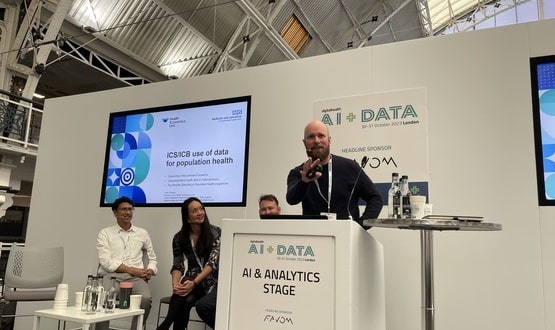Population Health experts: Use data to change long-term outcomes
- 31 October 2023

The NHS should draw on a wider range of data from non-health sources to provide interventions that protect health in the long term, said NHS England’s senior population health management advisor Andi Orlowski, at Digital Health’ AI and Data event on Tuesday.
“You can predict cancer from what people are buying in supermarkets,” said Orlowski, director of the Health Economics Unit. He acknowledged that collecting data on purchase choices of items such as toilet paper has provoked “outrage” but insisted: “It is data you should be happy to share.”
In response to a question from the floor about the need to detect “problems upstream”, he said: “We often spend a lot of time looking at the very top of the risk pyramid. There’s a misconception that people about to have an event [such as a disease diagnosis] will benefit most from intervention. They won’t. Use data to find people in the middle of the pyramid, further upstream.”
He gave the example of a “30-year-old analyst who is not doing enough steps in the day. Identifying [his] risks today will stop that heart attack in 20 years”.
Orlowski was speaking at a session on ICS/ICB use of data for population health. “There’s little evidence that systems improve health,” he said. “The problem for systems is how they work together. They have different goals, different measures of success.”
He urged the audience to reach for the freely available decision-making tool, Multi-Criteria Decision Analysis, to make different systems align. “Don’t buy it – you can get it for free,” he said.
The panel emphasised the need to engage with stakeholders, provide the data that users want, and engage with the general public.
In a presentation on forecasting emergency department admissions Anchut Manandhar, senior data scientist at NHS England, said users wanted data on workforce, workforce flows and demand for mental health services. There was a need for more granularity and a longer forecast horizon.
Conor Price, managing director of Primary Care Analytics, said building trusting relationships with partners in local government was key to bringing in the “wider determinants” of health.
Manandhar also emphasised the importance of “data flow”. “You need to be able to connect data from primary care all the way to ED [emergency department].”
Digital Health Intelligence has just released a market analysis report looking at the population health management market.





1 Comments
Happy to share more information from the talk, the references and the tools used! More information can be found at https://healtheconomicsunit.nhs.uk/what-we-do/smarter-spending-in-population-health/
Comments are closed.